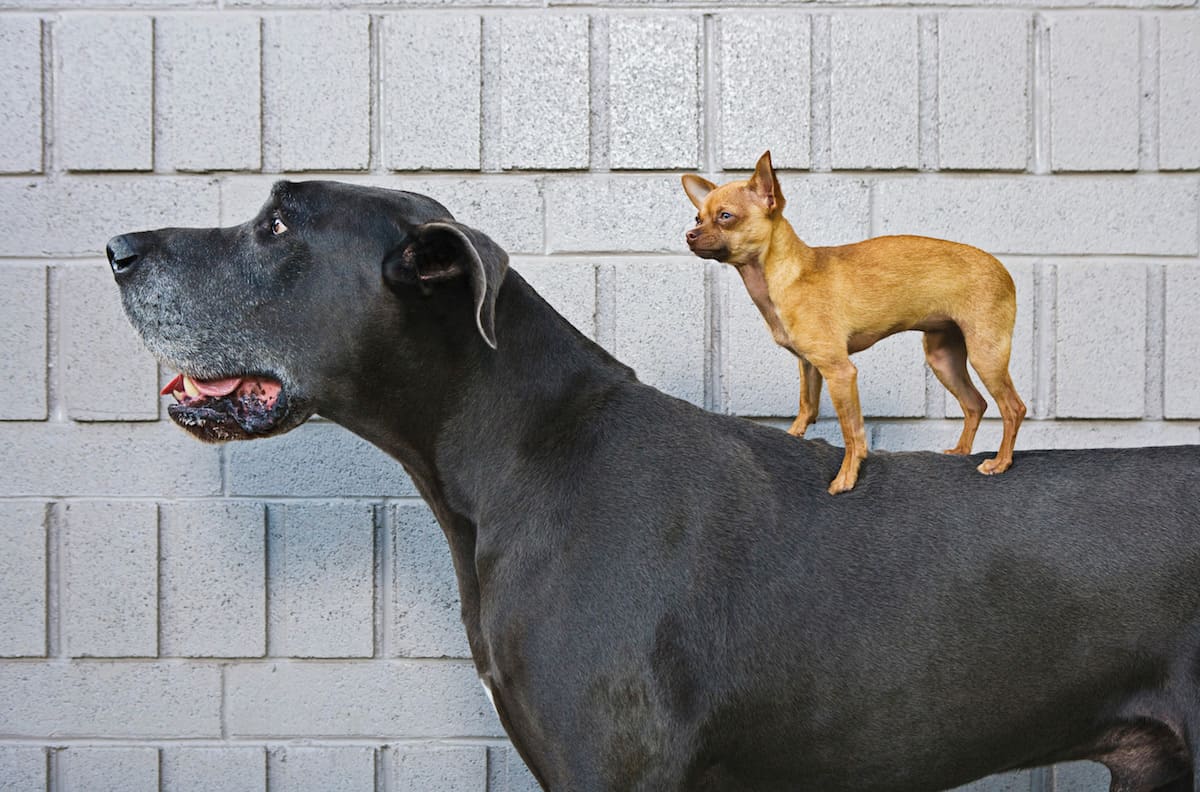
Great Danes get along famously with people, as hundreds of hilarious online photos would testify to. However, many people often wonder how well Great Danes get along with other dogs. Their size and strength make some dog owners afraid to add them to a multi-dog household.
So do Great Danes get along with other dogs? The answer is yes, Great Danes usually get along great with other dogs. That being said, some Great Danes do experience some situational aggression towards strangers (both human and canine). Certain circumstances may trigger more aggressive behavior than others.
If a Great Dane usually gets along well with other dogs, what are common triggers that could lead to aggression?
Read on to find out more about how Great Danes interact with other dogs, and how you can help them assimilate peacefully into a multi-dog household or act friendly towards other dogs on the street.
Great Danes Usually Get Along Great with Other Dogs
The good news is that Great Danes normally have a good reputation for being friendly with other breeds. This is true regardless of the size of the other dog.
In most cases, it’s more likely that a Great Dane might accidentally injure another dog in play than to do so purposefully. Most Danes simply don’t recognize their size and strength, which sometimes may result in these types of accidents. They are generally very affectionate and playful giants.
Despite being a little clumsy in their huge bodies, Great Danes are gentle in nature and can often be trusted even around very small and fragile animals like these baby chicks.
It seems as though Great Danes know they are larger than other animals and go out of their way not to accidentally hurt them!
Because they usually have a laid-back or playful personality and don’t tend to be high-strung, Great Danes usually enjoy popularity with other dogs in a household.
They often even find themselves as the favorite of much smaller dogs in the household!
Some Great Danes Are Stranger Aggressive
Despite their friendly nature with other dogs in the household with them, some Great Danes can be reactive or aggressive towards strangers when they enter their home turf.
This can include the following kinds of people:
- Houseguests (and their dogs) the Great Dane doesn’t know
- Maintenance workers such as meter men
- Visiting relatives and their dogs that the Great Dane does not know well
The reason that Great Danes can be aggressive towards strangers coming into their home territory is that they were originally bred to act as guard dogs for large country estates.
When strangers would come onto a country estate, these dogs would greet them at the gate and bark loudly to let the owners know that someone was on the property.
For many Great Danes, this authoritative barking is the extent of their aggression towards strangers until their owners intervene.
They are bred to be more of a deterrent than an attack dog, so true aggression in the breed is rare.
Leash Aggression in Great Danes
Great Danes can be very protective of their owners, and walking on a leash, this protective nature can manifest as barking or other dominant aggressive behavior towards other strange dogs and their owners on the street.
While this protective streak is a natural inclination of the breed, it is deepened and sometimes made worse by lack of proper socialization as a puppy.
For puppies that are kept at home a lot and are not exposed to outside stimuli like strangers at a young age, they will find sights and smells they are not familiar with overly threatening and will react accordingly.
One problem when walking a Great Dane is that other more reactive dogs will often show leash aggression first, causing the Great Dane to act aggressively in response to protect its owner.
But because of their large size, aggression in Great Danes is a serious problem that needs to be addressed before it escalates into a dangerous situation.
Reasons Great Danes Can Be Aggressive Towards Other Dogs
Other than territoriality and leash aggression, there are other reasons that Great Danes can have problems getting along with other dogs.
While Great Danes are generally a non-aggressive breed, aggressive individuals can arise in any breed as the result of poor training or genetics.
Here are some other forms of aggression that sometimes crop up in Great Danes:
- Food aggression: This aggression usually manifests as a phase in puppyhood and adolescence, similar to conflict aggression, and needs to be swiftly corrected. No dog should be allowed to growl or snap over its food or other resources. This is a very dangerous situation with any dog, much less a giant breed!
- Dominance or conflict aggression: Some Great Danes learn that their size and large voice are intimidating. Due to a naturally dominant personality can learn to use their size to intimidate both humans and other dogs. Conflict aggression usually arises in adolescence as a result of hormonal surges but can lead to lifelong learned behaviors.
- Fear aggression: Great Danes that are fear aggressive use aggressive tactics such as barking, snarling, or snapping to try and scare away stimuli that they perceive as threatening or terrifying to them. Nervous dogs are more likely to be fear biters. These dogs will growl or snap if another dog or person invades their personal space.
If these forms of aggression show up, the dog should undergo intensive training to address the problem and attempt to reduce aggressive triggers and responses.
Even though it is rare, when large dogs like Great Danes are aggressive towards smaller dogs, it can be a very dangerous situation for the other dog.
Ways to Avoid Dog Aggression in Great Danes
Since Great Danes are naturally friendly dogs that tend to get along with other dogs more often than not.
The best way to avoid them showing aggression towards other dogs is to show them early that being around other dogs is a positive experience.
Here are some ways you can make sure that your Great Dane is as dog-friendly as possible:
- Socialize your Great Dane thoroughly as a puppy, from the time they receive their first round of shots up through adolescence. This means socializing the dog with other kinds of dogs, animals, and people. The better socialized a puppy is, the less reactive and frightened they are of unfamiliar things. As a result, they will be less likely they will react aggressively.
- Expose Great Dane puppies to a wide variety of sights, smells, and sounds. Many dogs are naturally afraid of things that are unfamiliar to them. However, if they are continually exposed to new experiences throughout their puppyhood, then they come to see new experiences as positive experiences and are less likely to be both fearful and aggressive.
- Obedience training from very early puppyhood on basic commands such as sit, stay, come, heel, off, and down can help with potential aggression. Teach your dog proper manners when greeting guests and their dogs into the house. This lets them know you expect them to have a friendly (rather than suspicious) attitude towards strange dogs coming into the house or yard.
Socialization is Key
When it comes to making sure a Great Dane does not show aggression towards other dogs, the most important thing to address is socialization.
Aggression can arise from a number of issues. But the most common one is a lack of familiarity with other dogs and how to interact with them. This is especially a problem for Great Danes that are raised in a single dog household.
For Great Danes that are gentle and trusting towards both canine housemates and strange they meet, consistent socialization and sensory exposure is key to make sure that the dog’s formative experiences with other dogs and unknown situations are happy ones.
In addition to getting along with other dogs, you may also wonder how Great Danes get along with cats.


Our gorgeous girl is 18 months old and is generally very good with people, although she does occasionally get the great dane jitters and gets scared of people or objects, she gets over it with calming intervention. With other dogs she’s always been a bit tricky. She LOVES playing with other dogs, but is not at all gentle and they either got caught in the crossfire of her immense size and energy or became, rightfully, snappy to try and let her know they didn’t want to play. This has led to a few near fights because she just doesn’t read other dogs behaviour. She is also a very jealous dog and physically inserts herself into the situation if we socialise with other dogs. We are now very cautious and never allow her to meet other dogs off the lead, but she just doesn’t seem to get the message. We know she is capable of being calm and self-controlled (a rare treat). Is there a reason she feels the need to dominate other dogs in play like this? We know she’s young but don’t want to assume it’s something she’ll grow out of on her own. Can we help her grow out of it? We would love to feel a bit more relaxed with her.
My daughter has a Dane that is 2. She has been socialized since she found her at about 3 months old. She was attacked in a dog park and has since become aggressive with other dogs and food. She recently went through a plate glass window trying to get at a chiuaua in the neighborhood. The vet bills are mounting. What do we do?
Would help if she could meet other animals bigger and stronger than her. Take her out to the country on a leash and show here a couple of cows. The dane thinks it is the biggest and toughest animal. Helps for it to realize other animals are bigger. Danes are smart. Show her all kinds of bigger animals. Lamas, horses, donkeys. Donkeys kill dogs, keep her on a leash. This helps her to realize her size.
Danes are great protectors of their people and home turf. They are a defensive dog. Dog coming on their turf may get killed. Fence necessary for Great Dane. Also jumpers, do not let them see a dog jump. Can jump over 5 foot fence easy when realize can jump. Do not dig very much or bark unless a reason.
You attitude toward the other dog and person make a difference. You should always consider your dog first. Put her in a sit and reassure her before making a move. She needs to know you are the alpha dog to feel secure. Watch dog whisper. Do not let dog sleep with you. Makes dog think at top of power structure. Try crate training dog, even now makes such a difference for dog to have own den. Helps them feel secure thought would much rather be under your feet.
Should always have own soft bed for sleeping from puppy hood. This keeps hip problems away.
We adopted a 6 year old female GD 6 months ago, she was Ok with other dogs initially but is now very aggressive when out walking. She is scared of our open fire and takes herself to bed when it is alight.
Any tips and tricks much appreciated
I just brought a chihuahua puppy home as a second dog but our 4 yr old dane has prey insticts and isn’t taking to the new puppy well, I think he looks at him as prey, like a squirrel or rabbit. How do I get him to realize the puppy is a family member and not dinner?
I have a 4 month old GD male and he is getting more aggressive with the nipping and biting. How do I stop him from doing that.